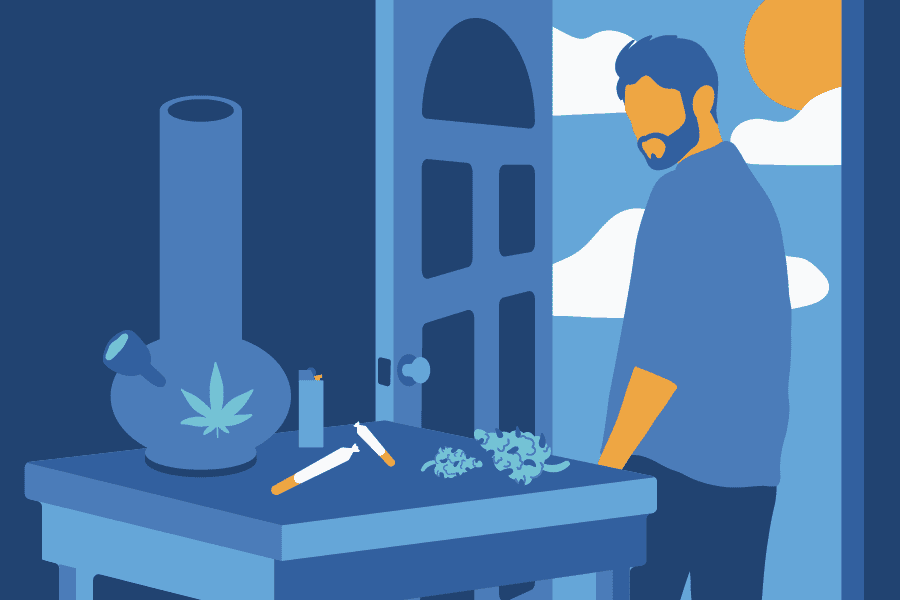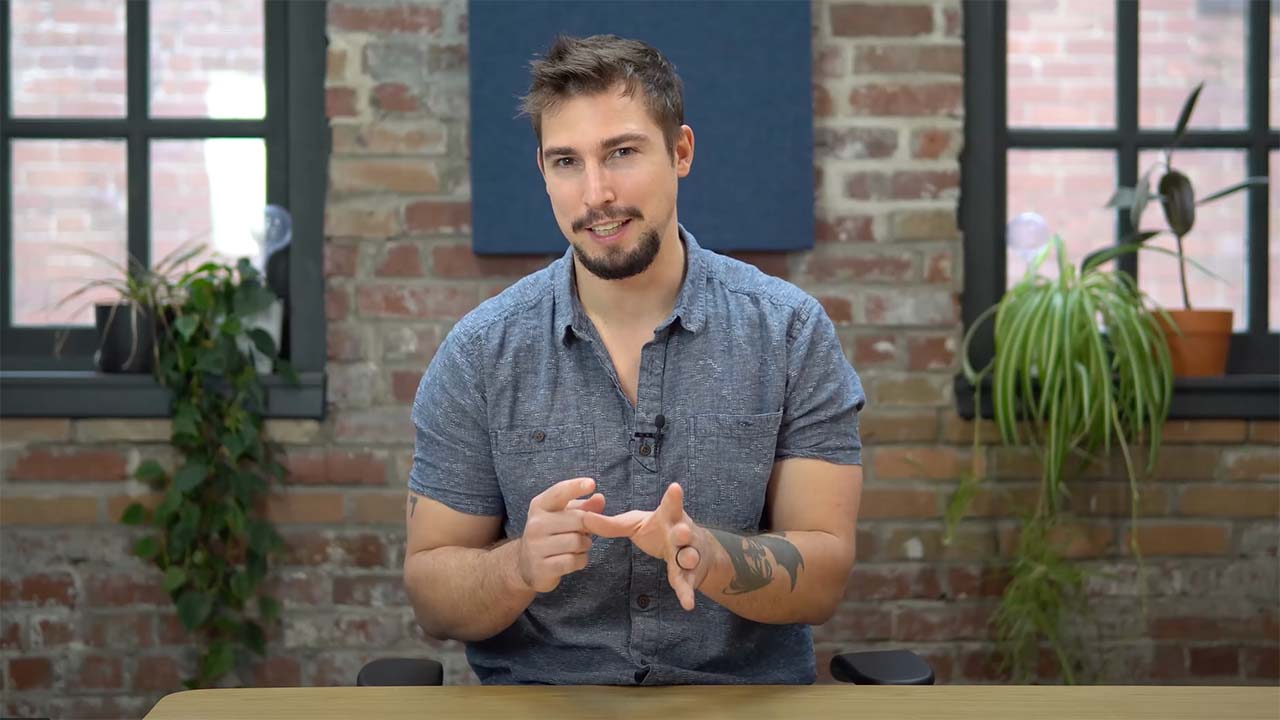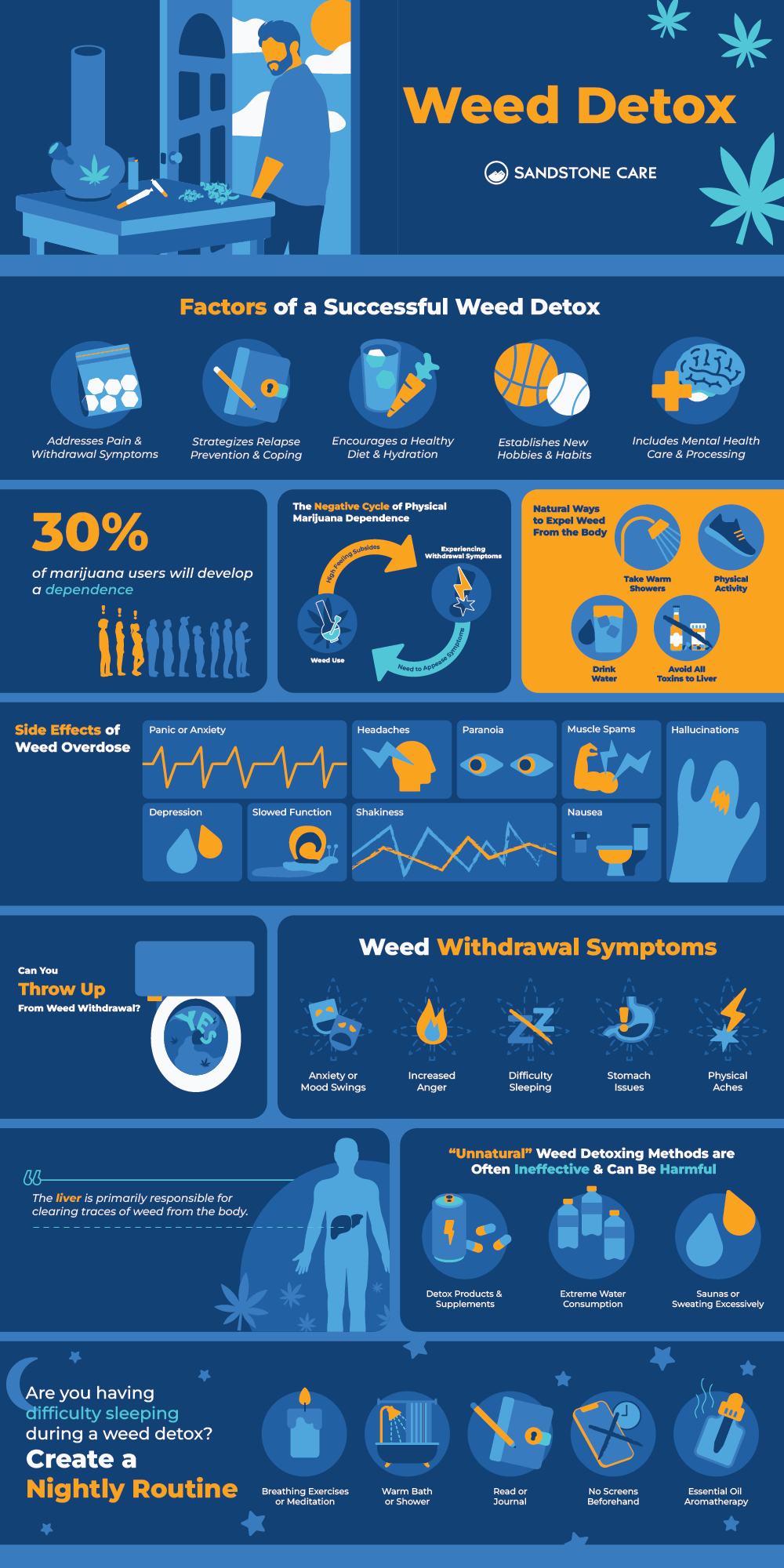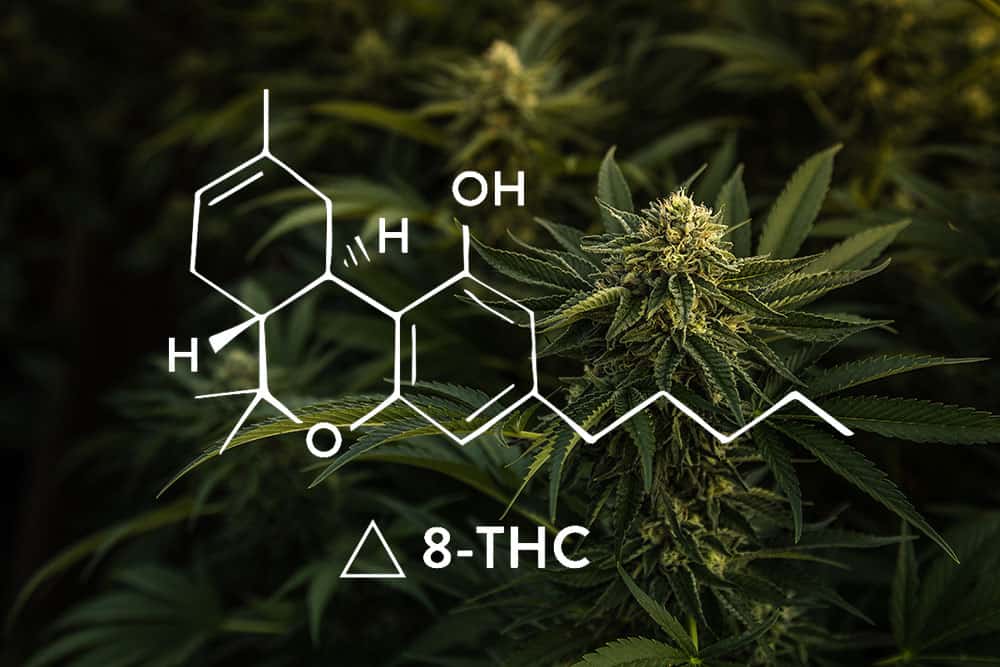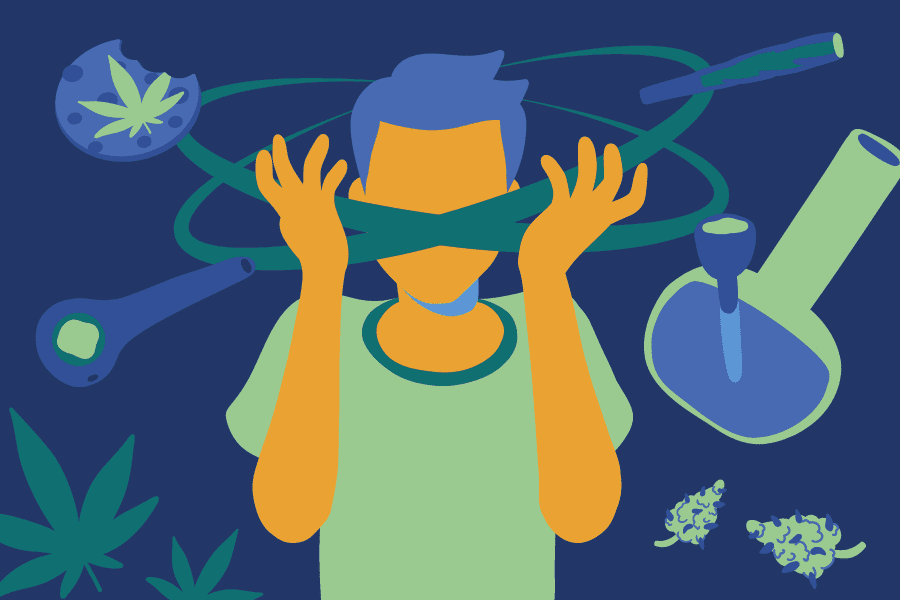Detoxing From Weed
How To Detox From Weed?
Detoxing from weed starts by stopping marijuana use, as this allows THC to begin leaving your system.
The specifics of the detox process depends on factors like how often you use weed, your metabolism, and your overall health.
Staying hydrated, eating healthy foods, and being physically active can help your body remove THC faster.
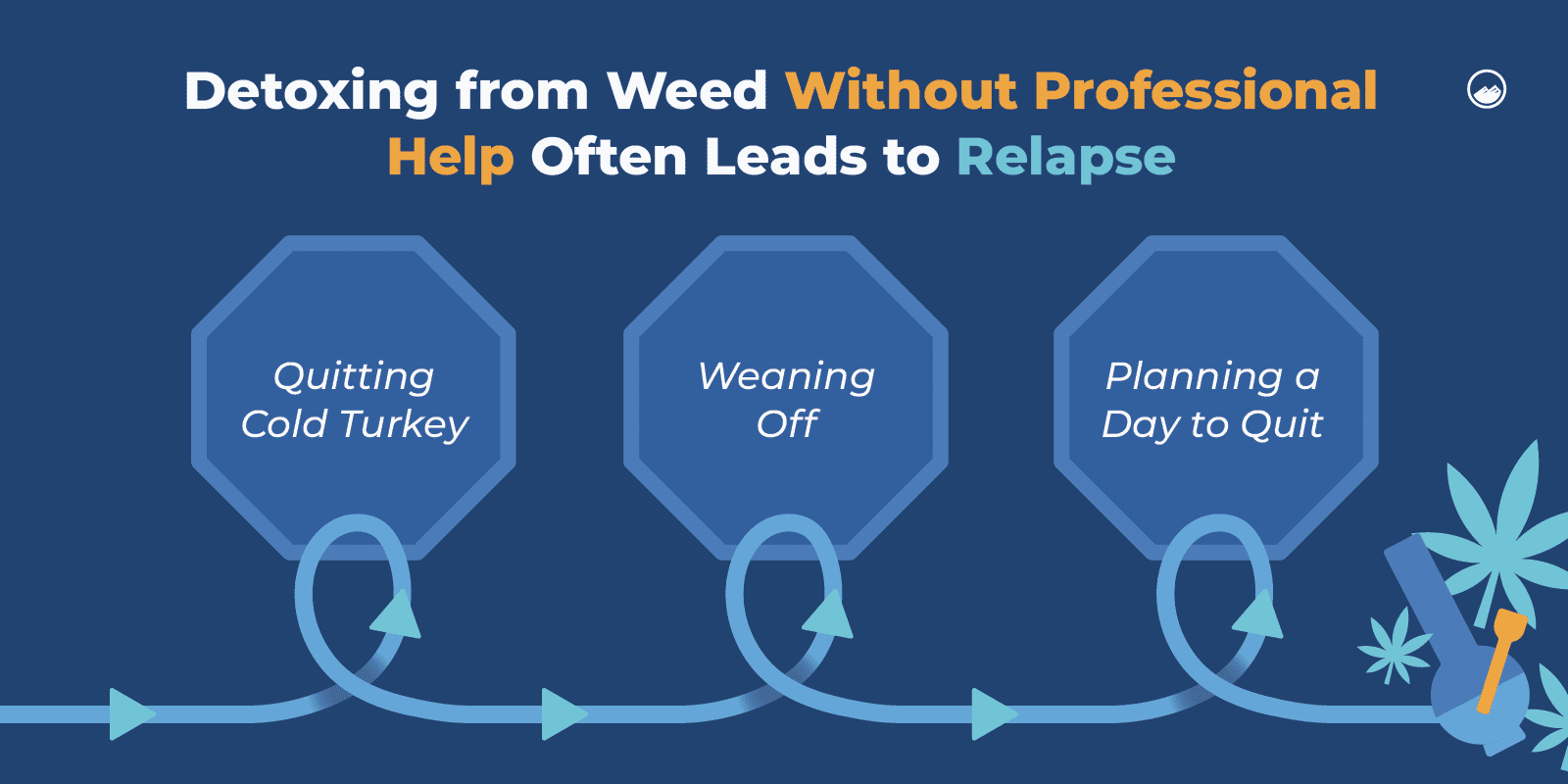
There is no single path for detoxing from marijuana or overcoming cannabis use disorder. Instead, detoxing from weed typically involves multiple different elements.
Working with others to set goals and adhere to them, navigating marijuana withdrawal symptoms, addressing physical and mental health changes common in detoxification, and more are all part of an effective detox plan.
Because of the personal nature of substance use disorder, finding professional addiction treatment is necessary to find the best approach to detox from weed while also addressing a myriad of other possible side effects, navigating the effects of marijuana overdose, and exploring the various forms the detox process may take.
Best Way To Detox From Weed?
There are multiple factors to consider when approaching marijuana detox for the best results. Some of the elements of effective marijuana detox include:
- Addressing physical health and needs, including aches, pains, or other physical symptoms commonplace during cannabis withdrawal
- Proper dieting, including drinking lots of water, eating consistent and healthy meals, and avoiding unhealthy options like caffeine
- Mental health care to emotionally process the change in a person’s brain chemistry, feelings of anxiety, panic, depression, or other psychological symptoms of marijuana withdrawal
- Relapse prevention strategies to cope with cravings to reengage with marijuana use during detox
- Therapeutic practices establish new hobbies, strategies, and techniques to maintain a healthy abstinence from marijuana through outpatient programs, support groups, treatment centers, and other forms of dedicated, professional help.
Marijuana detoxification is complex, and there is no single “trick” to navigating detox, cravings, or cannabis withdrawal.
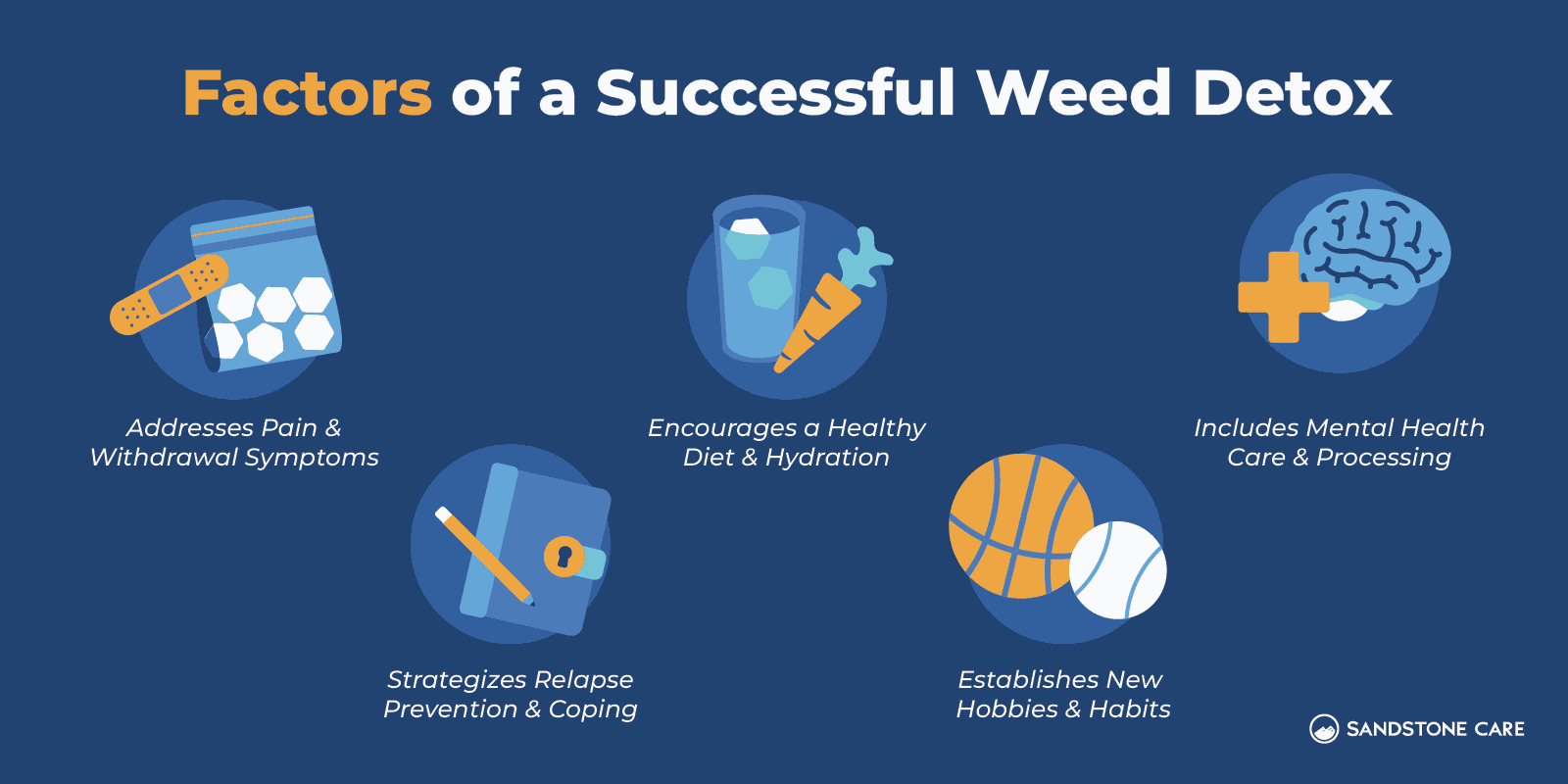
The best marijuana detox programs will address these factors for a comprehensive approach to weed-free life.
How Long Does It Take To Detox From Weed?
Cannabis can stay in the body long after its immediate effects wear off.
How long it takes to detox from marijuana will vary from person to person, depending on the frequency of use, intensity of use, and other factors.
However, weed detox takes more than a few hours or a day. Truly effective detox to expel the traces of tetrahydrocannabinol (THC) – the main psychoactive chemical found in marijuana that causes its effects – takes time. Effective detox from drug use takes about two weeks.
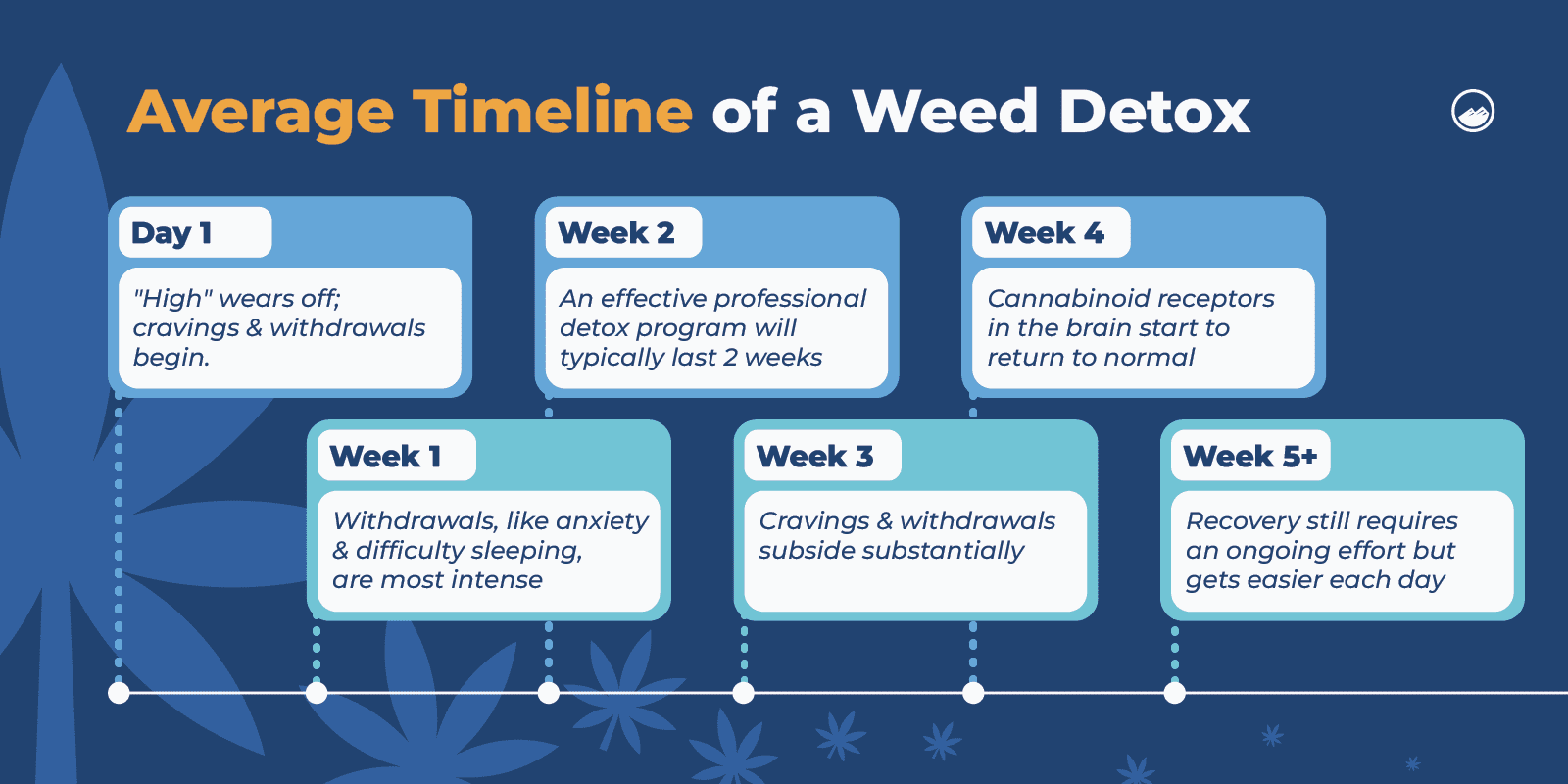
How To Detox From Weed Fast?
While there is no way to truly “speed up” a weed detox – proper hydration, dieting, warm showers, and physical activity can all help the body feel better.
Additionally, the body and mind will still require time to expel traces of THC from the body and mind.
Rather than trying to “speed up” the detox process, it is more important to use this time with medical professionals at a treatment facility to create an effective baseline to establish relapse-prevention techniques while addressing any symptoms of marijuana withdrawal.
How to Sober Up From Weed?
To sober up from weed, the best approach is to stay calm and give your body time to process the THC.
To avoid relapse and stay sober from weed permanently, it’s essential to develop healthy coping mechanisms and address the underlying reasons for using weed in the first place.
Many people use weed to manage stress, anxiety, boredom, or emotional pain, so identifying those triggers is crucial.
Once you understand what drives you to use, you can start replacing weed with healthier habits that help you cope without turning back to substances.
What Removes Weed From The Body?
There is no magic trick to removing all traces of weed from the body, but healthy behaviors and medical detox programs can certainly help the removal of THC from the system to be more comfortable.
While these treatment options to address the detox process are available, there is nothing an individual can take or eat to instantly remove weed from the body or to allow them to suddenly pass a drug test.
Using cold compresses and eye drops can help ease symptoms such as high eyes.
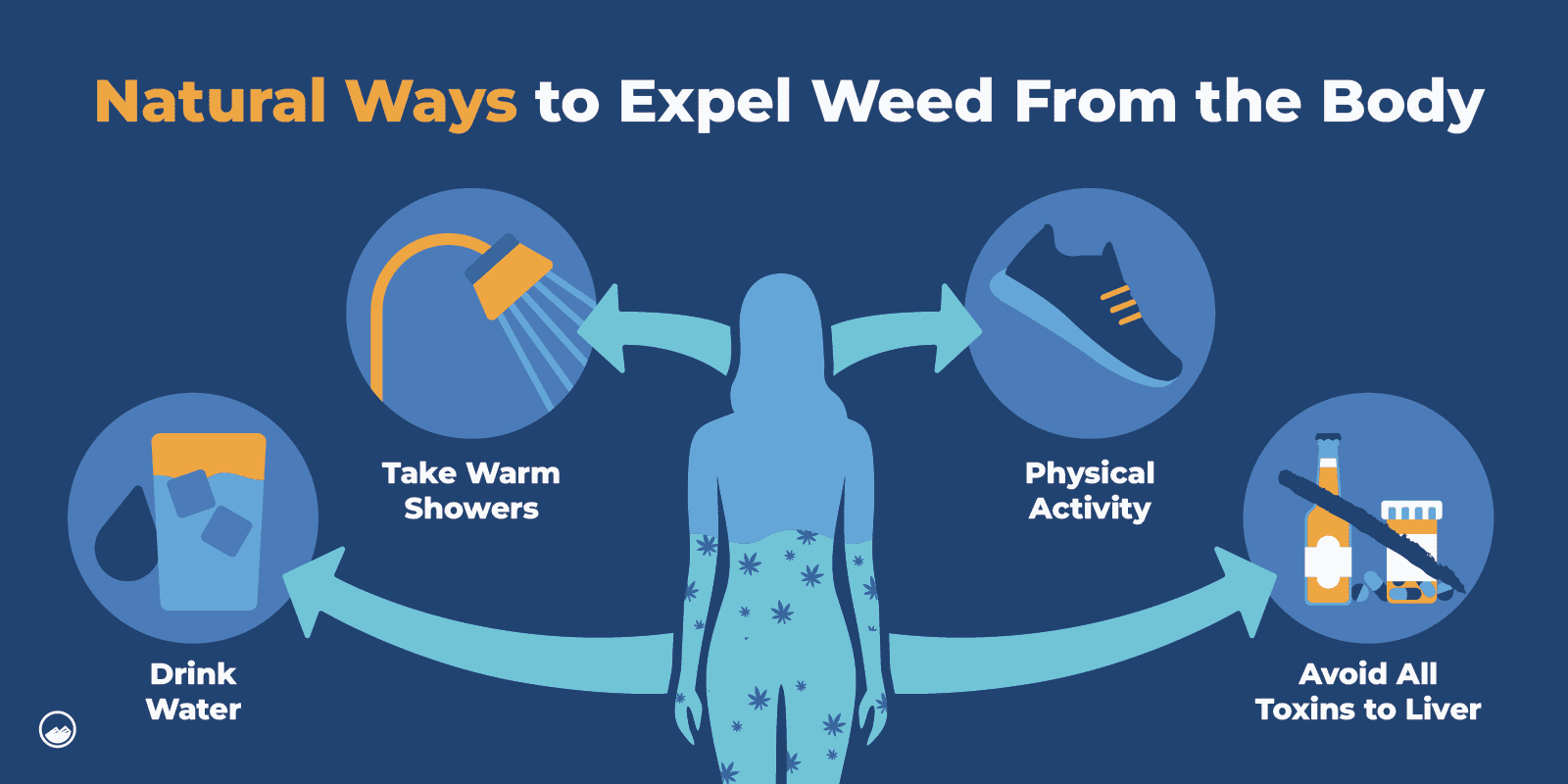
Rather, naturally expelling weed is the best approach. The liver is primarily responsible for removing weed from the body and processing other toxins, such as opioids, alcohol, and more.
Ensuring that the body is well taken care of can help the liver process these toxins and promote the expulsion of THC and other dangerous substances as the body returns to a healthy homeostasis.
How Long Does It Take For Cannabinoid Receptors To Return To Normal?
It typically takes about four weeks for the cannabinoid receptors in a person’s brain to return to a pre-marijuana use state.
Marijuana Dependence
Marijuana is the most commonly used illicit substance in the United States, with approximately 48.2 million people having used the drug at least once in 2019 alone. Of those, an estimated three in 10 will develop marijuana dependence.
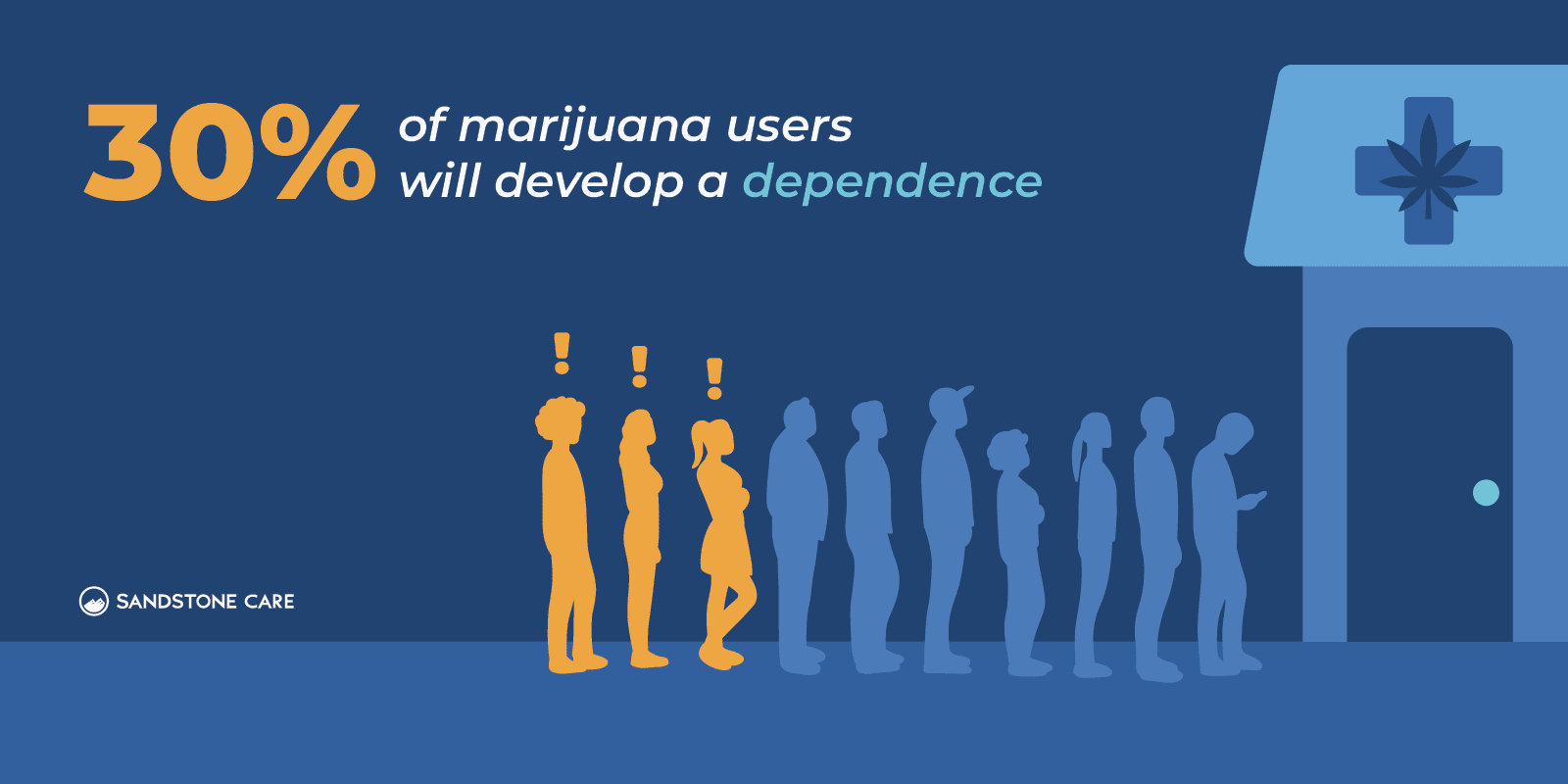
What Is the Definition of a Marijuana Addict?
Marijuana users or those overcoming marijuana use disorder are classified as individuals who not only engage with marijuana regularly but also may find it difficult to stop their marijuana use even when it begins to affect other areas of their life, such as professional life, academic life, or physical and mental health.
Likewise, even those who desire to cease the use of marijuana may find it difficult despite their efforts.
How Do You Diagnose Marijuana Dependence?
A marijuana dependence can cause it to be difficult for a person to “function normally” without the use of the drug and can fundamentally affect a person’s brain chemistry.
Additionally, marijuana dependence occurs after prolonged, heavy marijuana use as the brain not only adapts to process large levels of the drug but also expects it. The brain may also compromise its ability to produce dopamine – the chemical responsible for elevated mood or “happiness” – and instead become reliant on marijuana to produce it.
An individual may feel that marijuana is necessary to feel “normal” or that they cannot function, tend to daily responsibilities, or find it difficult to do so without first using marijuana.
Other mental health disorders can also influence marijuana use and marijuana dependence. This is known as a co-occurring disorder, where an individual is tasked with overcoming a marijuana use disorder alongside a mental health disorder.
Mental health disorders can also exacerbate the use of marijuana as a coping mechanism due to feelings of anxiety, stress, depression, and more, which can lead to marijuana dependence if unaddressed.
What Is Considered Heavy Marijuana Use?
Heavy marijuana use typically describes at least daily or multiple uses daily.
However, there are many different relationships an individual can have with marijuana, with heavy marijuana use being just one way to develop cannabis use disorder.
Is Marijuana Physically Dependent?
Yes, marijuana can cause physical dependency.
Prolonged and heavy use of marijuana can lead to physical marijuana withdrawal symptoms, prompting an individual to engage with cannabis to placate these effects and furthering a cycle of substance use that demands professional addiction treatment.
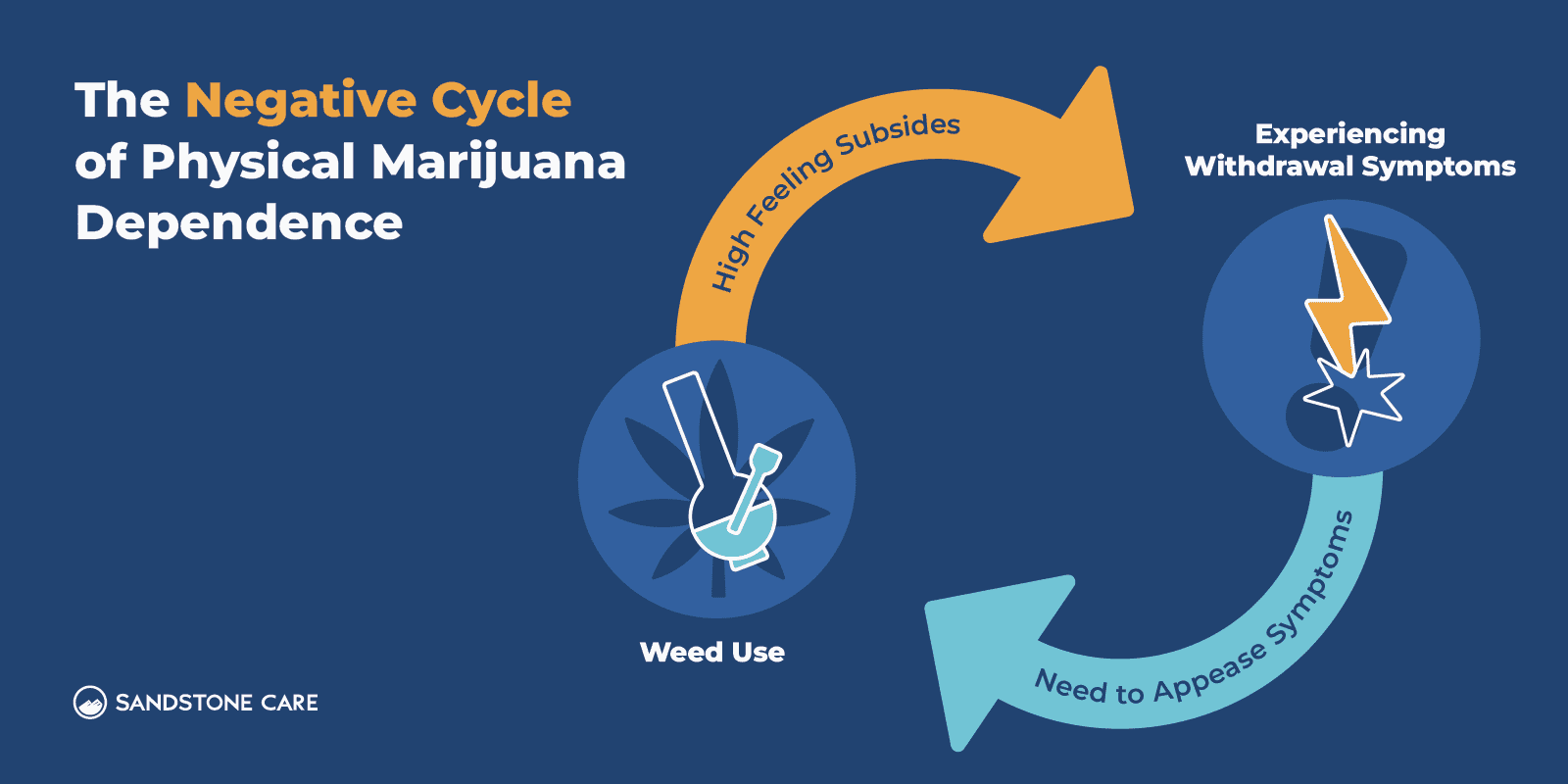
Overdosing On Weed
Can You Overdose On Weed?
While direct life-threatening consequences of marijuana use are rare compared to other drugs like heroin, opioids, or fentanyl, it is still possible to overdose on marijuana.
Despite its rarity, overdose is possible, and an individual can also put their safety and the safety of others in jeopardy in other ways. Individuals may use more weed than intended and experience profound mental and physical health effects. Others may take more risks, such as using cannabis before driving, resulting in a DUI.
How Much Does It Take To Overdose On Weed?
Overdosing on weed will vary from person to person, but the risk of overdose increases every time they use higher amounts of THC or do it more frequently than before.
This is especially the case if the increase in use happens suddenly.
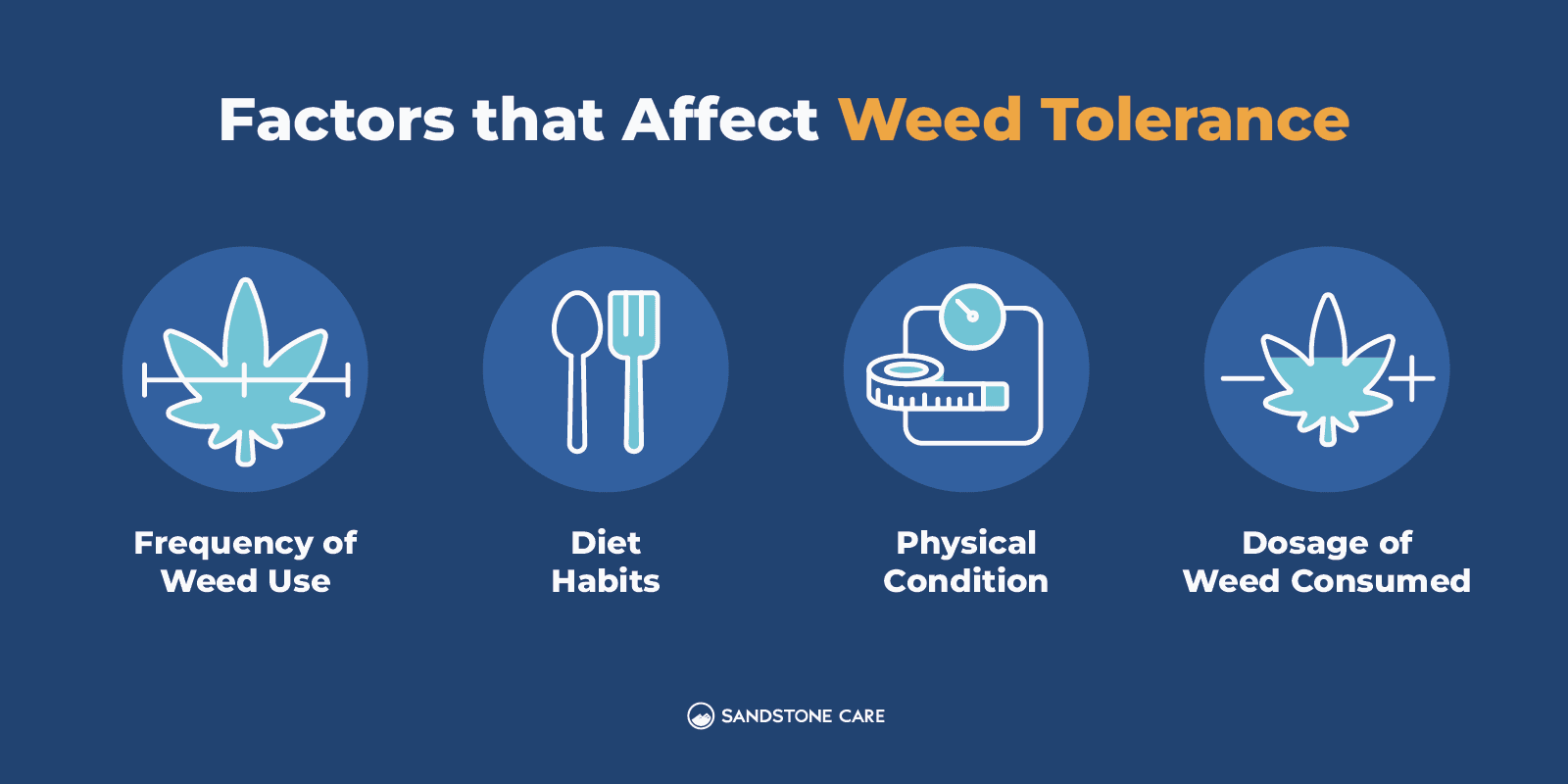
An individual using more weed than planned or more than they typically would result in an overdose, as well as increasing the frequency of use.
Marijuana overdose can affect both those overcoming a marijuana addiction and those who have recently begun to experiment with the drug. There is no “safe” level of marijuana use.
What Happens If You Overdose On Weed?
Overdosing on weed can have many challenging effects, and professional treatment programs to address the impact of cannabis overdose are necessary.
Some common side effects of weed overdose include:
- Intense anxiety
- Panic
- Depression
- Paranoia
- Hallucinations, either visual, auditory, or olfactory
- Shaking
- Vomiting
- Nausea
- Slowed motor function
- Muscle spasms
- Headache
- Gastrointestinal troubles
- Unresponsiveness or delayed reactions and cognitive processing
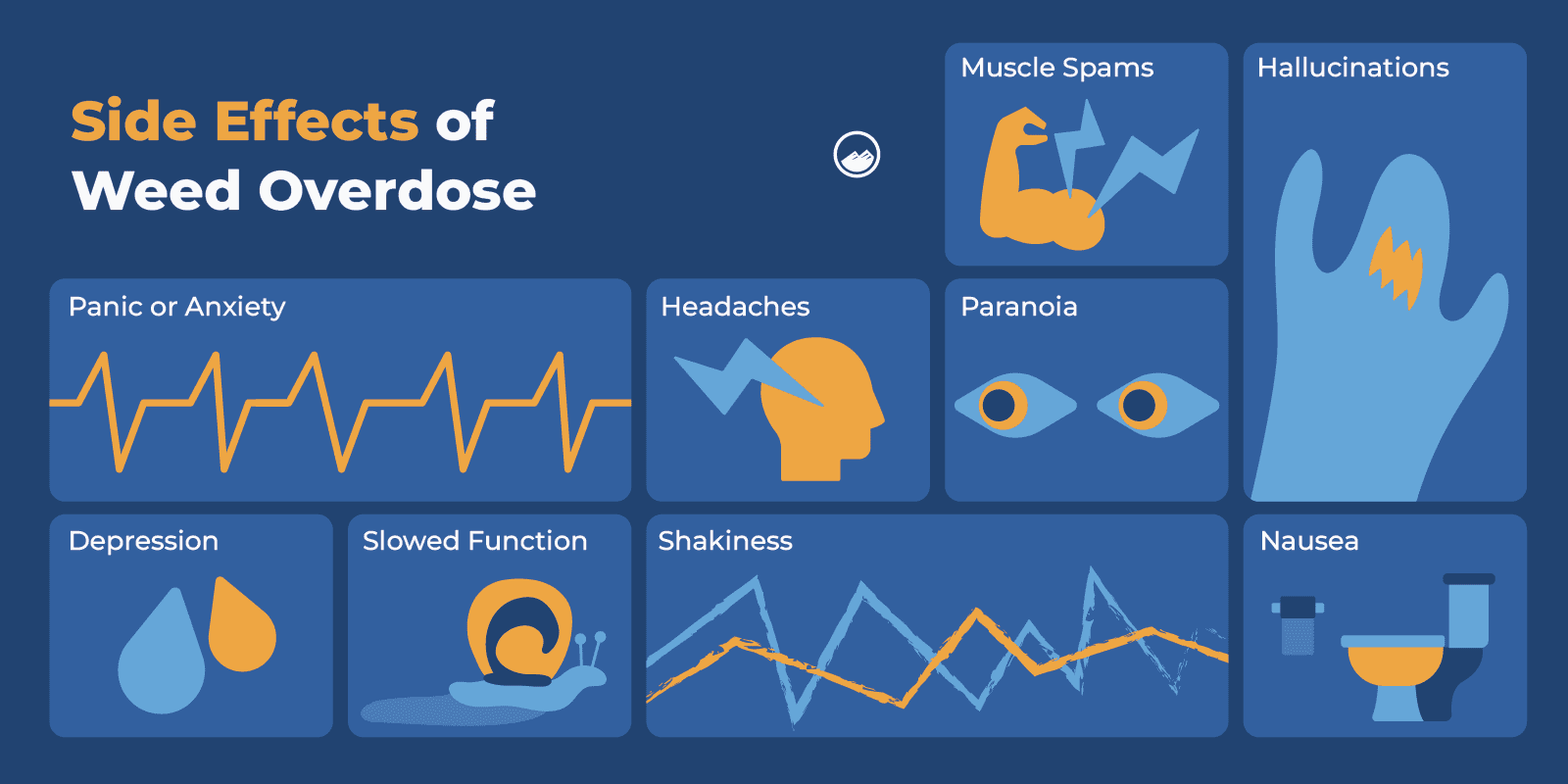
What Does Weed Intoxication Cause?
Each individual will uniquely react to marijuana use, and such use can always come with adverse side effects.
Some common symptoms of weed intoxication include:
- Loss of balance or coordination
- Paranoia or psychosis
- Compromised critical thinking, judgment, and decision-making skills
- Altered perceptions of reality
These effects of marijuana use can manifest regardless of how marijuana is ingested, and noticing these symptoms can prompt loved ones to administer a drug test.
What Does “Greening Out” Mean?
“Greening out” is a term used to describe when an individual has used too much marijuana for their body and mind to handle and can be connected to marijuana overdose.
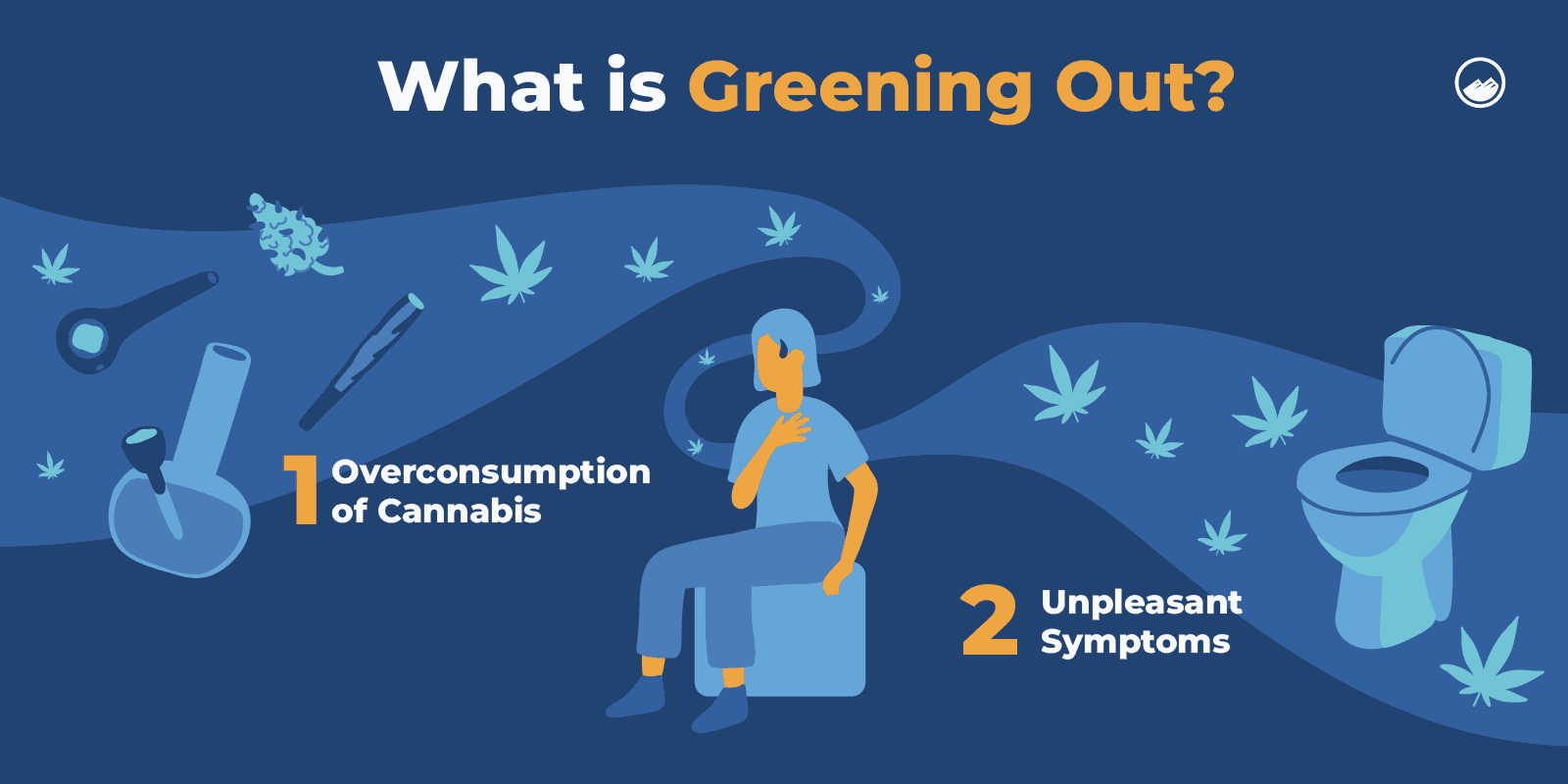
Derived from the term “blacking out” when used to describe the dangerous overconsumption of alcohol, “greening out” can have just as many negative effects.
Not only can greening out occur with excessive marijuana use in a single sitting, but increased frequency of marijuana use can further put an individual at risk. Likewise, combining marijuana use with other substances like alcohol or opioids can exacerbate these risks.
Some symptoms of greening out include:
- Anxiety
- Panic
- Depression
- Confusion and disorientation
- Dizziness
- Vomiting
- Diarrhea
- Increased blood pressure and heart rate
- Hallucinations
However, depending on a person’s unique relationship with marijuana and other substances, additional physical and psychological symptoms are always possible.
Getting help from a loved one or hosting an intervention for a loved one if noticing an increase in marijuana use or greening out can all help to promote the necessary change for a healthier life and take the first step toward overcoming substance abuse or marijuana use disorder.
Detoxing From Weed Side Effects
Weed detoxification can come with myriad side effects, necessitating professional help through either inpatient or outpatient programs to address the side effects of marijuana withdrawal and promote effective detox efforts.
Can You Have Withdrawals From Weed?
Yes, prolonged and heavy use of marijuana can cause an individual to experience withdrawal symptoms.
Professional help may be necessary to address these cannabis withdrawal symptoms.
What Are 5 Withdrawal Symptoms of Weed?
Cannabis withdrawal symptoms can vary from person to person.
However, there are some common withdrawal experiences that those overcoming marijuana use disorder may experience. These can include:
- Anxiety or mood swings
- Increase in anger
- Difficulty sleeping
- Loss of appetite or stomach pain
- Aches, pains, and physical fatigue
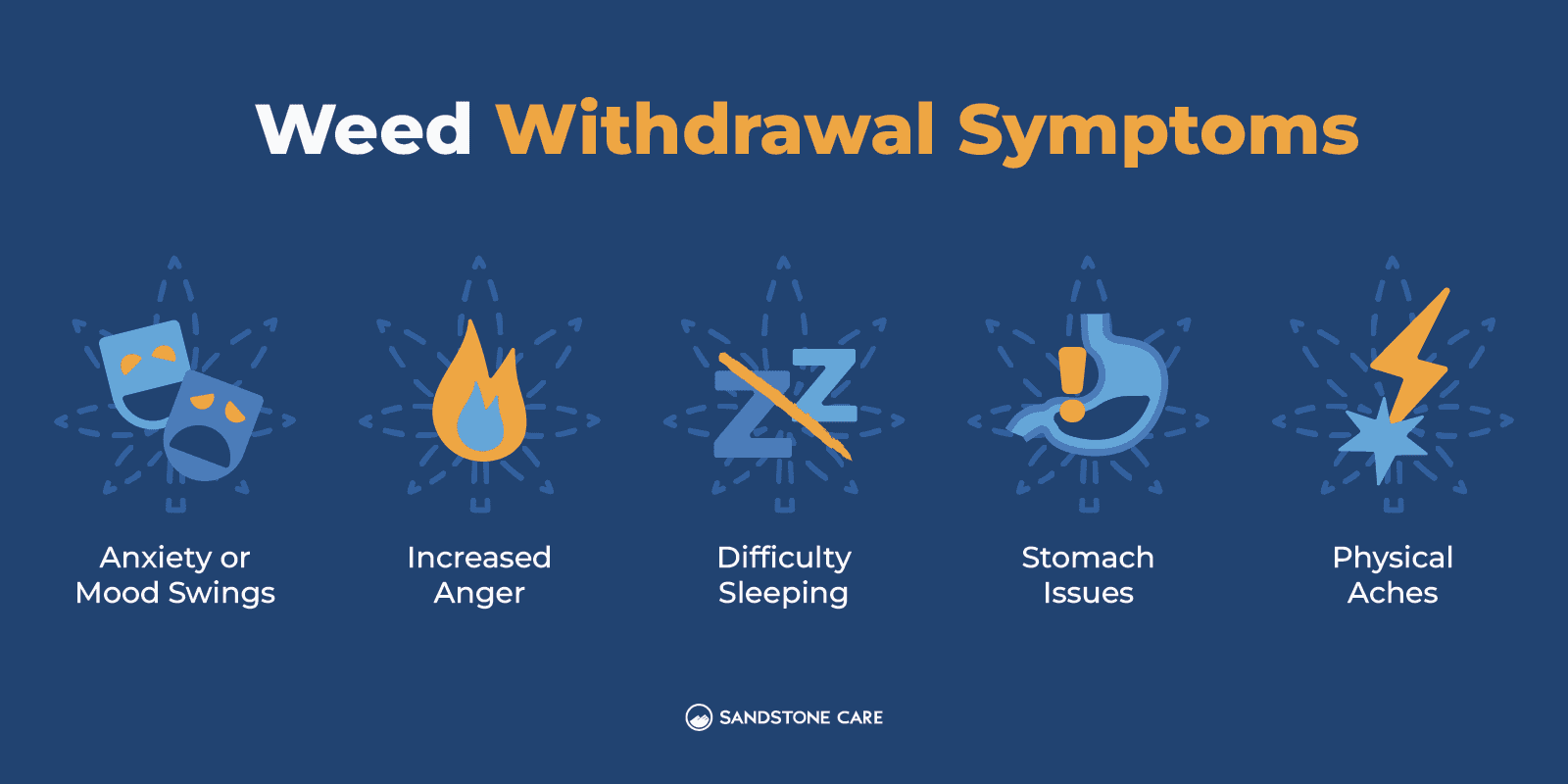
However, each individual will have their own experiences throughout their withdrawal timeline, and working with professionals can personalize each treatment program and provide medical detox options for a successful and sustainable detox plan.
What Do Weed Withdrawals Feel Like?
Weed withdrawal can be a difficult, even painful experience. Support from friends, professionals, and family can help those overcoming marijuana dependence address withdrawal.
Weed withdrawals are hard to overcome, and individuals will be tested throughout their detox efforts. Physical pains and emotional turmoil are common and can manifest quickly since a person’s last use of marijuana.
Anxiety, depression, mood swings, aches, pains, fatigue, nausea, difficulty sleeping, and more are common.
This is also when cravings are most prominent, and relapse is most common. Professional inpatient and medical detox programs can all help mitigate the intensity of withdrawal and help an individual transition to further forms of care through inpatient or outpatient programs.
Can You Get Sick From Weed Withdrawal Symptoms?
Yes. Nausea, vomiting, and more are possible cannabis withdrawal symptoms.
However, medical detox programs and professionals can help to address these symptoms.
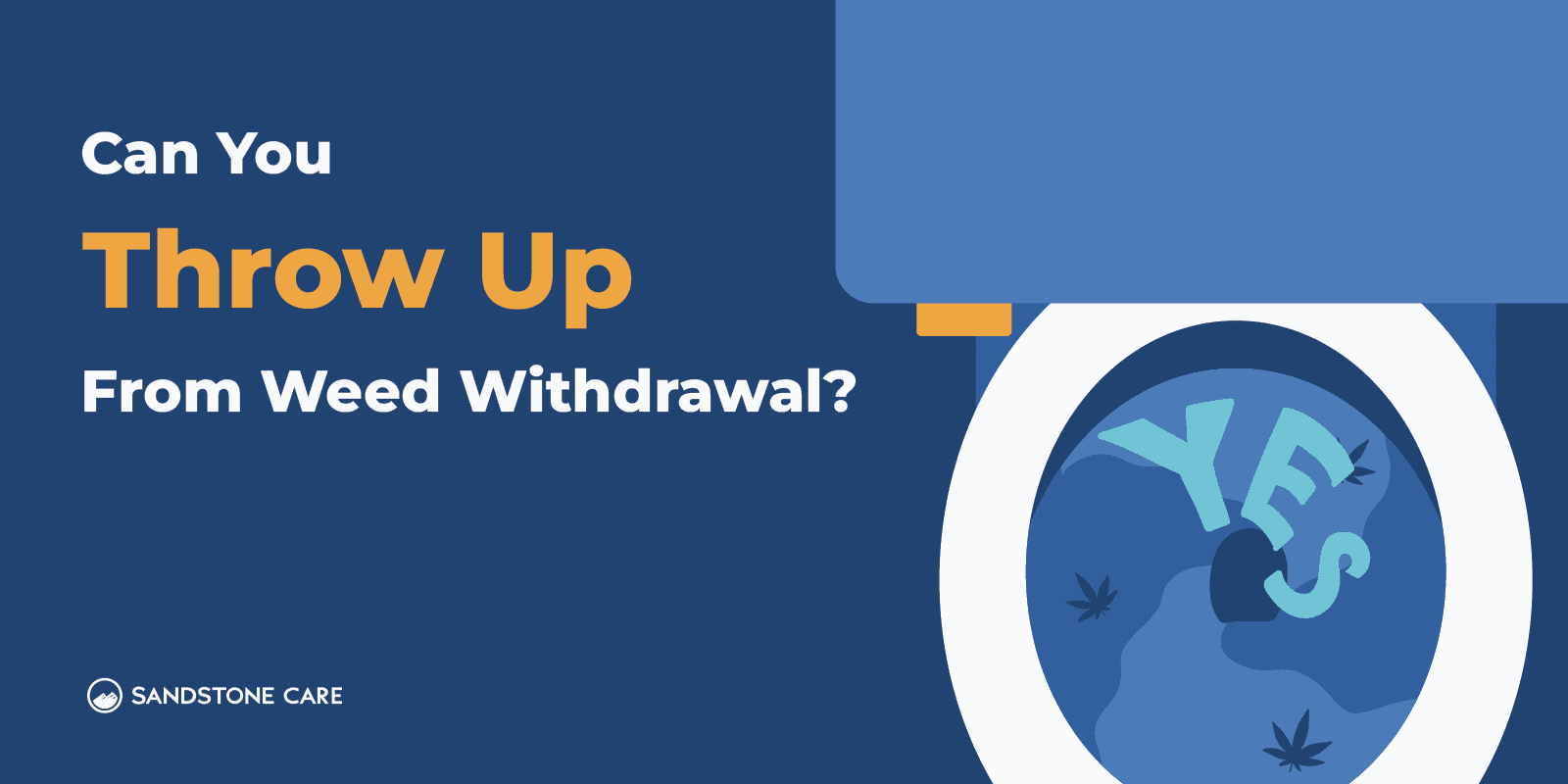
How Long Does Weed Withdrawal Last?
Each person will have their withdrawal timeline, and there is no definite date to which all cannabis withdrawal symptoms will have passed.
While each journey in overcoming cannabis withdrawal symptoms will be unique, there are some guidelines an individual can use.
For the first few days to about a week, withdrawal symptoms will be at their most intense, with symptoms beginning to lighten after about one week.
After about two weeks, these symptoms should subside, and an individual will be able to better address their physical needs and emotional needs with professionals, friends, and family.
How To Stop Weed Withdrawal Sweats?
Proper hygiene, dieting, and medication can all help with withdrawal sweats and other physical withdrawal symptoms or sleep problems throughout detox.
Professional detox programs can help individuals overcome these withdrawal symptoms with personalized techniques and medication where appropriate.
What Helps With Weed Withdrawal?
Having strategies to navigate cannabis withdrawal symptoms is paramount.
Withdrawal symptoms can be intense, and having established strategies to help with weed withdrawal can help. For some, having consistent bedtimes or establishing a nightly routine can address difficulty sleeping throughout withdrawal.
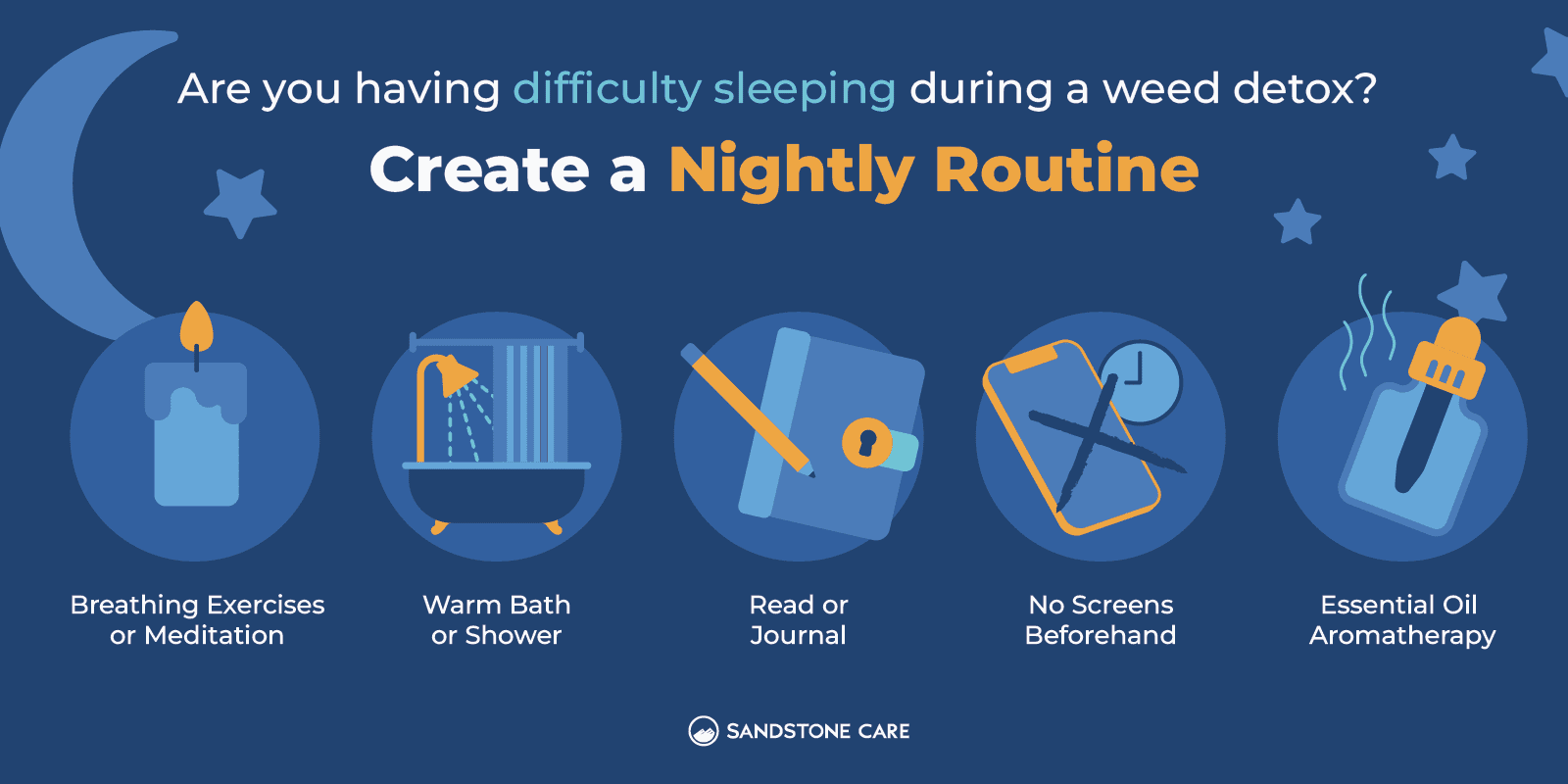
Others can engage in cognitive-behavioral therapy to address the emotional impact of marijuana and drug use. Understanding not just the symptoms of marijuana use and marijuana dependence but also the behaviors, thought processes, and other factors that surround the disease is paramount.
Lastly, some people may utilize medication to address withdrawal symptoms. However, while professionals can prescribe medication to address specific withdrawal symptoms, they are not a replacement for effective therapy or personal effort to overcome withdrawal challenges. They cannot eliminate the challenges common throughout detox.
How Do You Prevent Withdrawal Symptoms?
There is no way to completely prevent withdrawal symptoms.
While symptoms can be lessened with dedicated practices and strategies, the sudden cessation of marijuana can chemically affect a person’s brain and body. The return to a healthier homeostasis always comes with intense times of change.
How To Detox From Weed Naturally
Weed detoxification is best done through natural means – empowering the body and liver to process and naturally expel THC from itself.
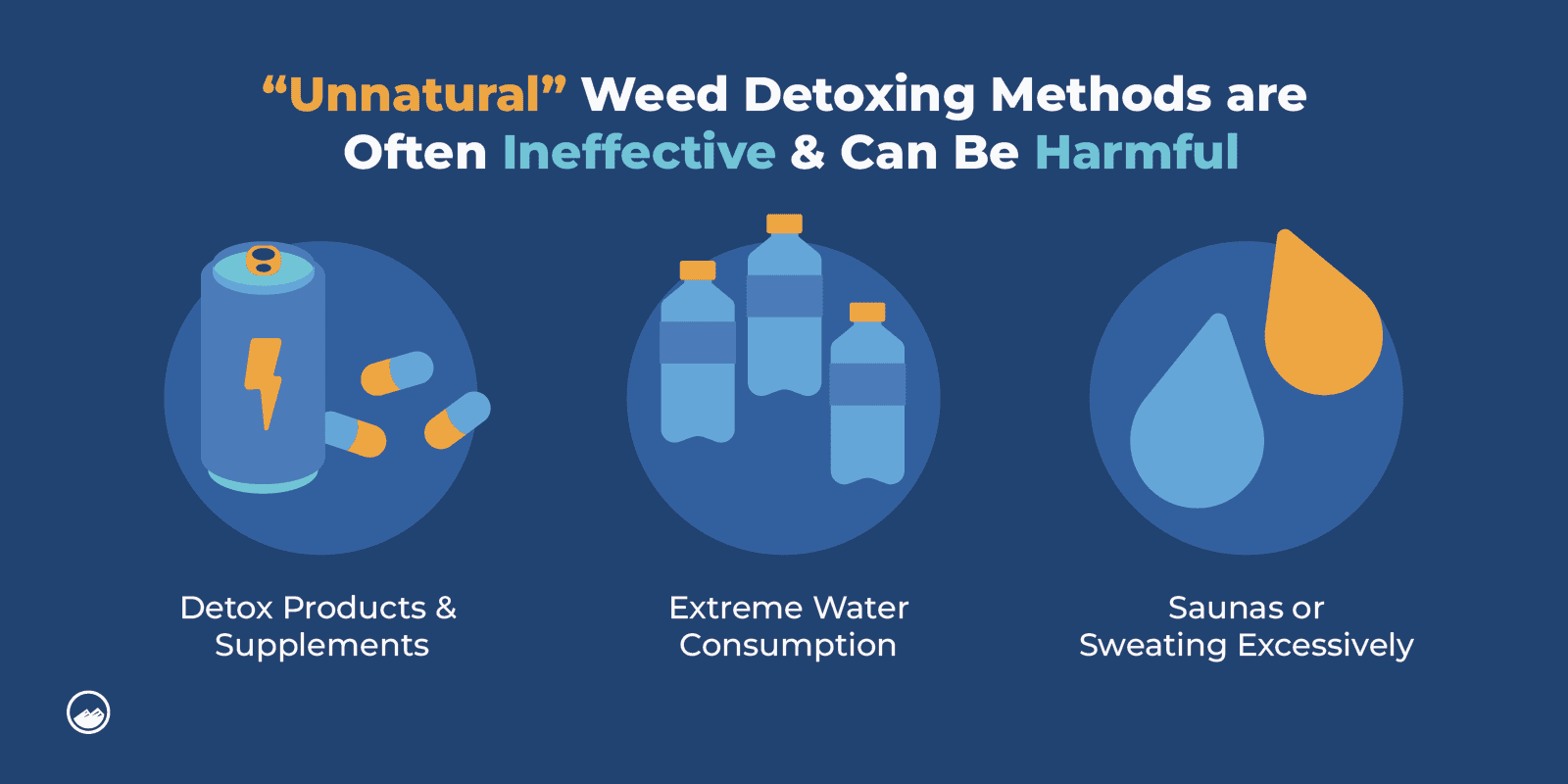
How to Get Weed Out of Your System?
To get weed out of your system, stop using it, stay hydrated, eat healthy, exercise regularly, and allow time for your body to naturally detoxify.
Using strategies to overcome difficulty sleeping, and working with professionals to engage in effective cognitive-behavioral therapy and effective detox programs can all help to empower each individual to detox from weed naturally.
How To Detox From Weed At Home?
Detoxing from weed at home can be dangerous, and professional treatment programs are always preferred and highly recommended.
While at-home dieting, water intake, sleeping, and support are possible, there is no replacement for professional medical detox.
How To Detox From Weed With Water?
Detoxing from weed with water happens when you drink plenty of water throughout the day to support your kidneys and liver, which are responsible for filtering out toxins, including THC.
However, water alone won’t speed up the detox process significantly, and it’s important to combine hydration with other healthy habits like regular exercise and eating nutritious foods to boost your body’s natural detoxification.
Keep in mind that drinking excessive amounts of water won’t drastically reduce THC levels and may even be harmful, so focus on steady, healthy hydration.
What Clears Weed From The Body?
Weed can stay in the body long after its effects have worn off. The liver is primarily responsible for clearing traces of weed from the body.
However, this takes time, and weed may still be detectable through a drug test even after the effects of weed have subsided, up to a few weeks or months, depending on how it is tested.
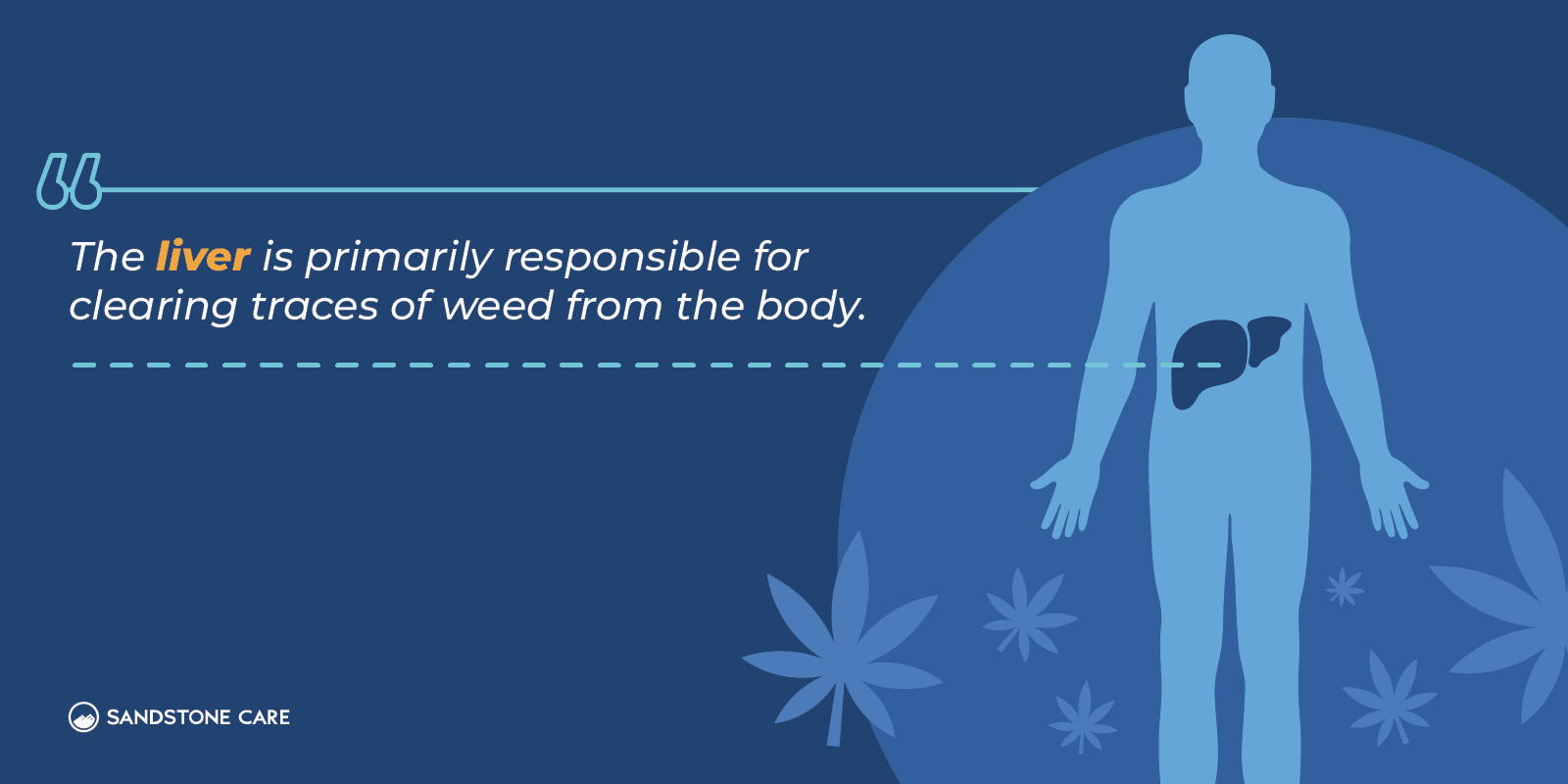
How Long Does It Take For Weed Withdrawal To Stop?
It typically takes about two weeks for withdrawal symptoms to subside, though each individual will have unique withdrawal timelines and experiences.


Let’s Take the Next Steps Together
Taking the first step toward detox and recovery from marijuana addiction is a profound experience, and each individual should celebrate their newfound dedication to a sober life. At Sandstone, we champion the opportunity to work with teens, young adults, and adults alike to take the first step toward addressing substance dependence.

